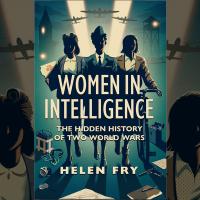Helen Fry's Women in Intelligence is the work of years of incidental surprises and shocking discoveries made in the course of other research. It is, in essence, a compendium of the vast and complex array of roles undertaken by women working for the British secret services during the two world wars. But more than this, it is a celebration of the previously unrecognized women who contributed so much to the Allied successes between 1914 and 1945 – whether they are named or still shrouded in mystery. These were the trailblazers who enabled, sixty years later, women to take the top-spots in MI5 and other British intelligence services, proving that the 'fairer sex' were equally as capable as men in undertaking traditionally masculine jobs.
Perhaps surprisingly, Women in Intelligence contains a huge number of roles, stories, and characters, with Fry considering everyone from the famous glamorous spies like Mata Hari to the women who organized packages of itching powder destined for the bedding and uniforms of German soldiers. Beyond that, there are the codebreakers of Bletchley Park, the analysers of aerial photographs, the translators, and the collectors of titbits of information on enemy troop movements and morale. Then there are the often-overlooked secretaries and clerks, entrusted with information requiring the highest levels of security and responsibility, working alongside their bosses on everything from accounts to running agents and issuing orders. Throughout it all, Fry convincingly argues that all of these women made a valid, and valuable, contribution to the war effort: these women weren't 'just' secretaries to the men doing the 'real' work, but experts in their own field, regularly consulted and utilized for the most important tasks.
Part of the surprise might come from the fact that we rarely stop to define what 'military intelligence' means. The exciting bit, the bit that draws millions of people to cinemas around the world, is the James Bond-style, adrenalin-loaded action. There were, of course, ‘Jaime Bonds’, but the purview of the British secret services was so much wider. And it is here that Fry’s attention rests, with those women tirelessly, and often thanklessly, working behind the scenes, discovering and analysing data, drawing conclusions, writing reports and sending orders. Some readers might not appreciate this, as it lacks the strong, thrilling narrative of the few isolated published biographies of female intelligencers. But instead, Fry aims to emphasize the number of women involved – rather than to focus on those few individuals who are already well known – and to honour them all. The downside is that the sheer quantity of stories can, occasionally, be a little overwhelming – although it proves her argument absolutely. And it can be frustrating: Women in Intelligence offers almost too much of a tantalizing glimpse into women in all walks of intelligence, for it leaves the reader wanting more.
The sources, of course, restrict what can be included. There is a depressing frequency in the times Fry states that 'the sources aren't available for a fuller assessment'. Despite explaining why – that so many files remain classified to protect both the operatives and their families, and the British state, should war break out again – it is still disappointing. Fry therefore has to rely on what sources are available, requiring skills of detection par excellence, along with memoirs and oral histories. Memoirs are both a historian’s dream and nightmare: they add flesh to the bones of official documents, bringing a human touch and personal insight to otherwise dry material. But they are never ‘true’. At best, they are based on memories, which are subject to change and reinterpretation; at worst, they are written to present the subject in a certain, usually flattering, light, glossing over or explaining away awkward facts and events. It is little wonder, then, that some of the women appear in perhaps a better light than they deserve. Fry is less critical than, for example, Vigurs in her study of women in SOE. This is largely a symptom of the different styles of book – Vigurs wants a few women to be understood warts and all, whereas Fry is more concerned with showing the volume of women’s work in all areas of intelligence – but it is noticeable.
Yet in Fry's aims, she absolutely succeeds. After reading Women in Intelligence no-one can doubt the significant contribution women made to every aspect of military intelligence during the two world wars. What's more, by extending our definitions of intelligence gathering and use – specifically to include the secretaries and clerks – she has opened a whole new avenue ripe for investigation. This is a book that will inspire PhD students for decades. Beyond that, it will shift every reader's perception about what it meant to be a member of the most secret of services. And perhaps most importantly, it will allow us to understand and honour anew the unsung heroes – male or female – who fought in the shadows to win peace in the light.


